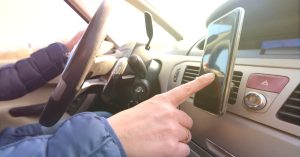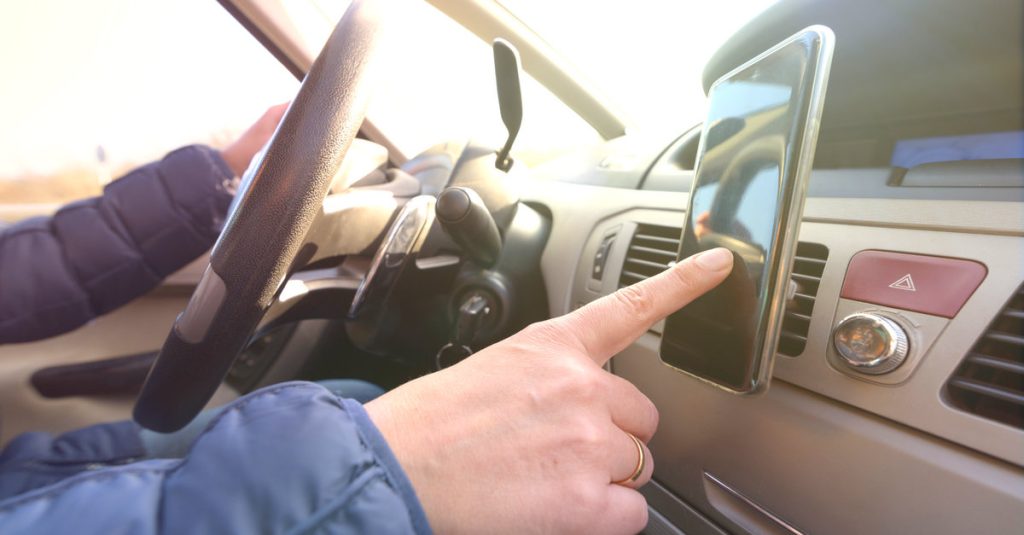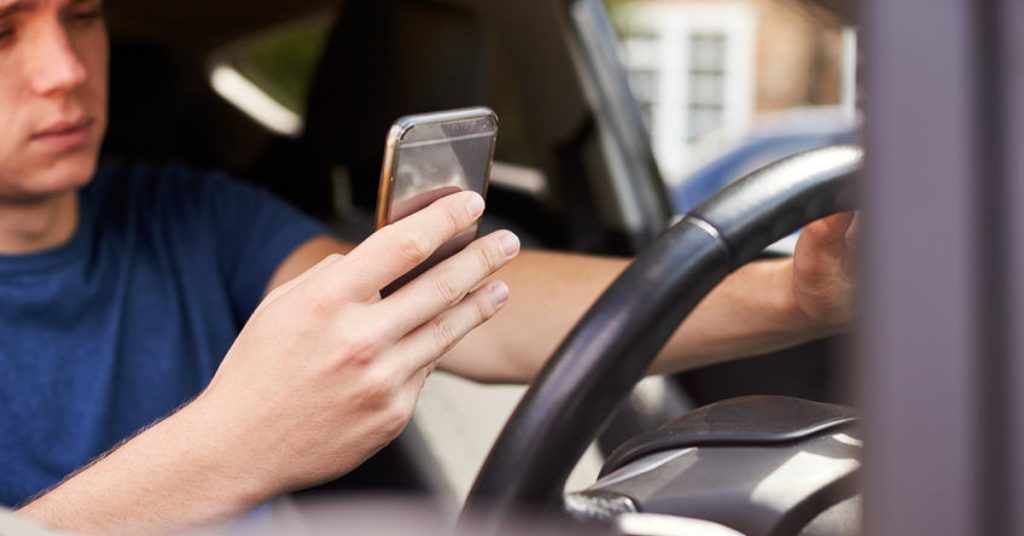Posts Tagged ‘Massachusetts distracted driving laws’
Proposal to Strengthen Massachusetts Hands-Free Driving Law By Adding Ban on Recording and Broadcasting While Driving

Drivers are not allowed to pick up cell phones under the Massachusetts hands-free driving law, but can quickly tap the device for activation of hands-free mode or GPS.
A dangerous trend has emerged on our roads, cell phones and social media accounts, with the rise of drivers “vlogging,” live-streaming and making video phone calls. In a 2020 survey, more than 20 percent of drivers admitted to recording video on cell phones. This is more than double the response from 2015.
Now, after a cyclist’s tragic death, a local lawmaker is proposing Massachusetts update its hands-free driving law to ban both recording and broadcasting video while driving.
Nationwide, 48 states have banned texting while driving and 24 states have passed hands-free driving laws, according to the Governors Highway Safety Association.
Massachusetts would join four other states which have banned recording and broadcasting as part of their hands-free laws, according to state Sen. Jo Comerford, D-Northampton, who has proposed the legislation.
Sen. Comerford proposed “Charlie’s Law” in the wake of a cyclist’s death near Northampton High School in October 2021. A 23-year-old driver is accused of video chatting on the FaceTime app, then running past a stop sign and striking the cyclist in a fatal bike crash, according to local news reports. The driver now faces criminal charges, including negligent motor vehicle homicide. Meanwhile, state lawmakers held the first hearing on Charlie’s Law earlier this month.
Background on Massachusetts Distracted Driving Laws
Looking to prevent injuries and deaths in car accidents, Massachusetts passed a ban on texting while driving in 2010. After many years of debate, lawmakers reached agreement on a more comprehensive hands-free driving law in 2019.
The Massachusetts hands-free driving law took effect in early 2020 and drivers now face fines for violations, starting with $100 for the first offense.
For third and subsequent offenses, drivers face up to $500 in fines and an insurance surcharge. They must also attend a distracted driving education program.
Under the hands-free law, drivers are only allowed to touch mobile phones and electronic devices to quickly activate hands-free mode, when devices are mounted to a windshield, dashboard or center console. Drivers are still allowed to use voice-to-text commands and make phone calls so long as cell phones are properly mounted.
As it stands, the Massachusetts hands-free driving law does not specifically ban drivers from making video conference calls or vlogging activities, such as recording or live broadcasting video of one’s self while driving to post on social media sites. As long as cell phones are mounted, drivers are not violating the law.
Drivers may be cited or charged if police investigate a car crash and find they violated another traffic law, such as a marked lanes violation. But updating the hands-free law – which is a primary enforcement law – may allow police to stop and cite drivers they see using cell phone video features before a crash happens.
Sen. Comerford has proposed S. 2733, “An Act Prohibiting Video Recording or Broadcasting While Driving.” The bill proposes adding language to the existing law stating no operator shall record or broadcast video of themselves on a mobile device, with a few exceptions.
- Drivers would still be allowed to record or broadcast video in an “emergency or exigent circumstance” or “when it is so clearly in the public interest as to override the public safety purpose of this sentence.”
- Dash cams can still be used to record traffic conditions or passengers in a vehicle, but they must be mounted. This allows commercial drivers, Uber and Lyft drivers to continue recording passenger behavior.
More Than Twice As Many Drivers Admitted to Recording While Driving in 2020
In its 2021 Driving While Distracted study, State Farm Auto Insurance reported 22 percent of drivers admitted to recording behind the wheel in 2020, compared to 10 percent in 2015.
Younger drivers were more likely to engage in this behavior:
- Nearly half – 44 percent – of drivers in the 18 to 29-year-old demographic admitted to recording video while driving.
- More than a third of drivers age 30 to 39 admitted the same.
This was not the only increase. State Farm reported 89 percent of drivers – or nearly 9 out of 10 – admitted to engaging in one of the 14 distracted driving behaviors covered in its online survey.
One troubling note was most drivers in states which had passed hands-free driving said they were aware of laws, but one in five were not informed. Six percent of the drivers even said their state did not ban handheld cell phone use.
Contact Breakstone, White & Gluck For a Free Legal Consultation – Boston Personal Injury and Car Accident Attorneys
At Breakstone, White & Gluck, our Boston personal injury lawyers offer more than 100 years combined experience representing those injured by negligent and reckless driving. Our attorneys work with clients throughout the Boston area, including those who live and work in Boston, Cambridge, Somerville, Everett, Brookline, Arlington and Quincy.
If you have been injured in a car accident caused by another driver’s negligence, you may require medical care and have to miss time at work. You may have many questions. For a free legal consultation, contact Breakstone, White & Gluck at 800-379-1244 or use our contact form. Our attorneys will review the facts of your case with you and help you determine whether you have a potential claim.
Distracted Driving Laws Are Saving Teen Lives, Research Says

Distracted driving laws are reducing teen driver crashes, study says.
When drivers use cell phones, they introduce grave dangers to the road and are more likely to crash. This is why many states have now passed distracted driving laws. But how effective have these laws been?
Highly effective, suggests new research. Distracted driving laws are saving the lives of both teen drivers and their passengers in car crashes. The greatest impact is seen when states ban all drivers from cell phone use, not just junior operators under age 18.
Researchers at Massachusetts General Hospital published the findings from a 10-year study in Pediatrics journal. Reviewing more than 38,000 motor vehicle crashes reported between 2007 and 2017, researchers found a significant decrease in fatal motor vehicle crashes among drivers age 16-19.
There was actually a 43 percent reduction in deaths among 16-year-old drivers in states which passed hand held cell phone bans for all drivers (not just a ban for junior operators under 18).
Researchers had the challenge of working with evolving cell phone laws. When the study began in 2007, just 15 states had passed one type of distracted driving law, often a texting while driving ban. By the end, researchers were reviewing the impact of multiple bans, including texting while driving bans (both primary and secondary), hand-held bans and bans on all types of cell phone use for drivers under age 18.
Distracted Driving In Massachusetts
Massachusetts distracted driving crashes are a serious concern, having caused the deaths of drivers as well as pedestrians and cyclists. Once drivers pick up a cell phone, it is hard to break their attention away. The younger the driver, the harder it can be and this makes it essential for teens to establish good habits from the start.
In Massachusetts, a high school student was the first to be criminally prosecuted for motor vehicle homicide, texting while driving and negligent operation of a motor vehicle, according to CNN. Police allege the 17-year-old Haverhill man exchanged nearly 200 text messages in the hours leading up to the fatal crash in 2011. The crash killed a 55-year-old New Hampshire driver and seriously injured his girlfriend, who was riding in his passenger seat. As the prosecutor said at sentencing, “there are no winners today.” He went onto say, “…in a split second, many lives are forever changed.”
The state of Massachusetts reported a 170 percent increase in distracted driving crashes between 2014 and 2016. Over the past few years, lawmakers and safety advocates negotiated proposals to pass a hands-free law or a ban on handheld cell phone use. This finally reached resolution in November 2019, taking effect in April.
Under the Massachusetts Hands-Free Law, drivers are no longer allowed to use hand-held cell phones. They must now use voice-activated technology. The goal is to reduce injuries by taking away the act of reaching for a phone and attempting to dial. However drivers must still use voice-activated cell phones cautiously. Drivers can still cause accidents when using voice-activated technology and can still be held liable if they cause someone’s injuries.
Teen drivers – Massachusetts junior operators under age 18 – are still not allowed to use hands-free cell phones under the new law.
Free Legal Consultation – Boston Car Accident Attorneys
At Breakstone, White & Gluck, our attorneys fight for the rights of those injured by negligent driving in Boston and across Massachusetts. With more than 100 years combined experience, we have a reputation for strong results for victims of car accidents, truck crashes and bus collisions.
If you have been injured, call our attorneys for a free legal consultation: 800-379-1244 or 617-723-7676 or use our contact form.



